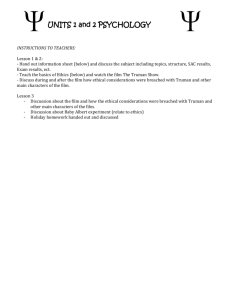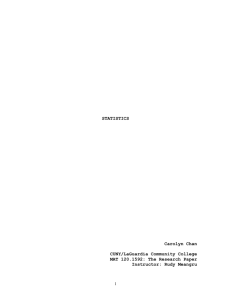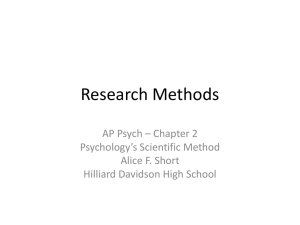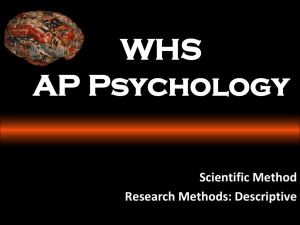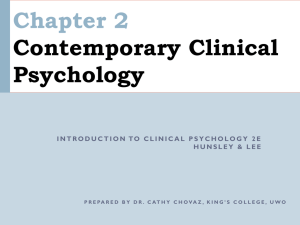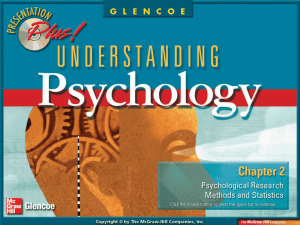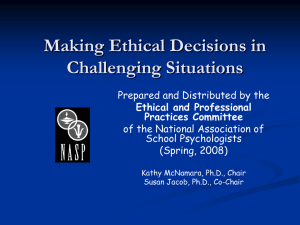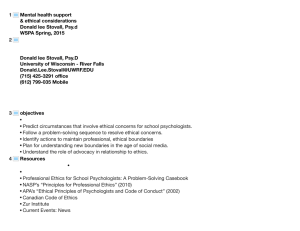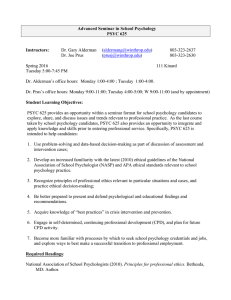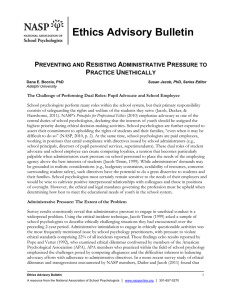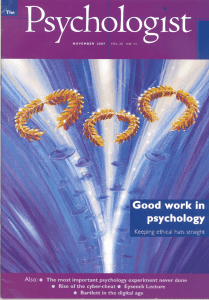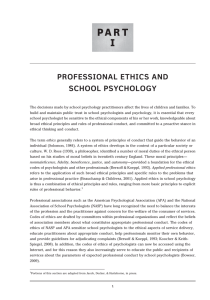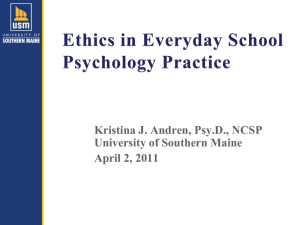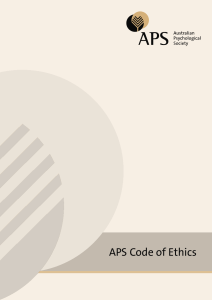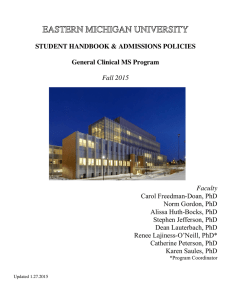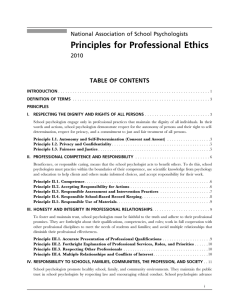Review - Research Methods & Statistics
advertisement
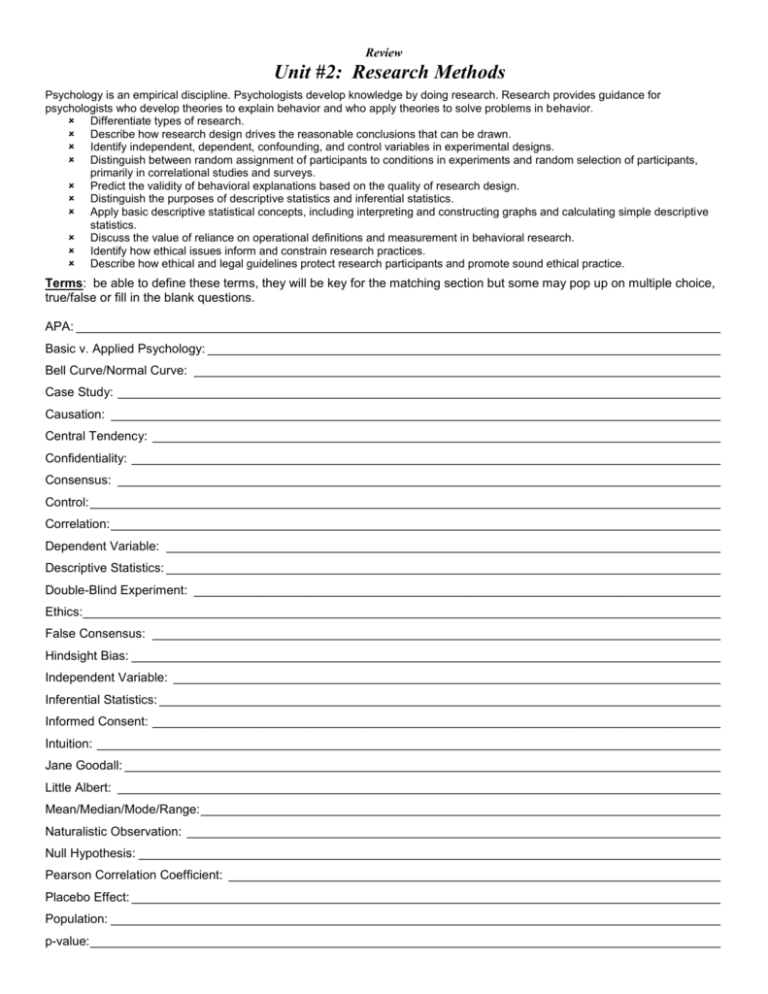
Review Unit #2: Research Methods Psychology is an empirical discipline. Psychologists develop knowledge by doing research. Research provides guidance for psychologists who develop theories to explain behavior and who apply theories to solve problems in behavior. Differentiate types of research. Describe how research design drives the reasonable conclusions that can be drawn. Identify independent, dependent, confounding, and control variables in experimental designs. Distinguish between random assignment of participants to conditions in experiments and random selection of participants, primarily in correlational studies and surveys. Predict the validity of behavioral explanations based on the quality of research design. Distinguish the purposes of descriptive statistics and inferential statistics. Apply basic descriptive statistical concepts, including interpreting and constructing graphs and calculating simple descriptive statistics. Discuss the value of reliance on operational definitions and measurement in behavioral research. Identify how ethical issues inform and constrain research practices. Describe how ethical and legal guidelines protect research participants and promote sound ethical practice. Terms: be able to define these terms, they will be key for the matching section but some may pop up on multiple choice, true/false or fill in the blank questions. APA: _____________________________________________________________________________________________ Basic v. Applied Psychology: __________________________________________________________________________ Bell Curve/Normal Curve: ____________________________________________________________________________ Case Study: _______________________________________________________________________________________ Causation: ________________________________________________________________________________________ Central Tendency: __________________________________________________________________________________ Confidentiality: _____________________________________________________________________________________ Consensus: _______________________________________________________________________________________ Control: ___________________________________________________________________________________________ Correlation: ________________________________________________________________________________________ Dependent Variable: ________________________________________________________________________________ Descriptive Statistics: ________________________________________________________________________________ Double-Blind Experiment: ____________________________________________________________________________ Ethics:____________________________________________________________________________________________ False Consensus: __________________________________________________________________________________ Hindsight Bias: _____________________________________________________________________________________ Independent Variable: _______________________________________________________________________________ Inferential Statistics: _________________________________________________________________________________ Informed Consent: __________________________________________________________________________________ Intuition: __________________________________________________________________________________________ Jane Goodall: ______________________________________________________________________________________ Little Albert: _______________________________________________________________________________________ Mean/Median/Mode/Range: ___________________________________________________________________________ Naturalistic Observation: _____________________________________________________________________________ Null Hypothesis: ____________________________________________________________________________________ Pearson Correlation Coefficient: _______________________________________________________________________ Placebo Effect: _____________________________________________________________________________________ Population: ________________________________________________________________________________________ p-value: ___________________________________________________________________________________________ Random Distribution/Assignment: ______________________________________________________________________ Random Sample: ___________________________________________________________________________________ Reliable: __________________________________________________________________________________________ Scientific Method: ___________________________________________________________________________________ Single-Blind Experiment: _____________________________________________________________________________ Skepticism: ________________________________________________________________________________________ Standard Deviation: _________________________________________________________________________________ Stanley Milgram: ___________________________________________________________________________________ Statistically Significant: _______________________________________________________________________________ Survey Method: ____________________________________________________________________________________ Type I Error: _______________________________________________________________________________________ Type II Error: ______________________________________________________________________________________ Valid: ____________________________________________________________________________________________ Main Ideas: the following concepts will appear in the fill-in-the-blank or short answer sections of the test. These topics are broader and can be found in the “Binder” or textbook. Methods of Psychological Study What are the positives and negatives of the various methods of research/experimentation? Why would a psychologist select one method of study over another? Scientific Method Steps Reasons why it is used Conducting & Analyzing Experiments/Statistics Variables, control groups, single & double blind experiments, placebos, & correlations v. causation Why are “Ethics” important to Psychologists? Define the term ethics Identify some of the more important research & experimental standards psychologists must follow? What are some classical experiments that led to the development of said ethics? History & Approaches of Psychology All material covered in the first unit is “fair game” for this quest too, even if you weren’t tested on it last time.






